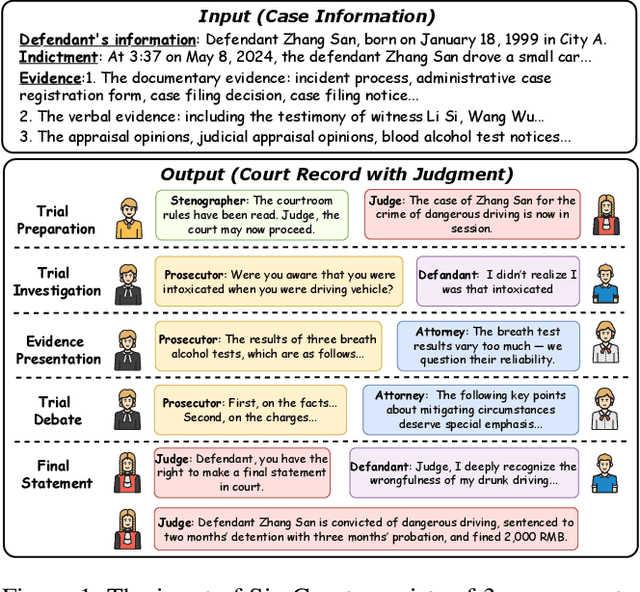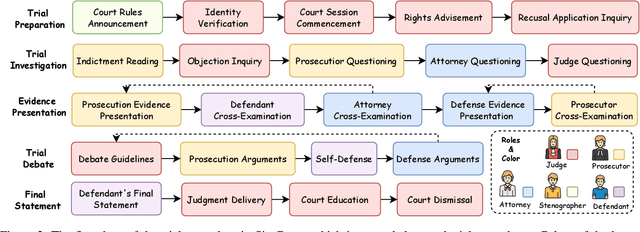Weihang Su
Multi-Field Tool Retrieval
Feb 05, 2026Abstract:Integrating external tools enables Large Language Models (LLMs) to interact with real-world environments and solve complex tasks. Given the growing scale of available tools, effective tool retrieval is essential to mitigate constraints of LLMs' context windows and ensure computational efficiency. Existing approaches typically treat tool retrieval as a traditional ad-hoc retrieval task, matching user queries against the entire raw tool documentation. In this paper, we identify three fundamental challenges that limit the effectiveness of this paradigm: (i) the incompleteness and structural inconsistency of tool documentation; (ii) the significant semantic and granular mismatch between user queries and technical tool documents; and, most importantly, (iii) the multi-aspect nature of tool utility, that involves distinct dimensions, such as functionality, input constraints, and output formats, varying in format and importance. To address these challenges, we introduce Multi-Field Tool Retrieval, a framework designed to align user intent with tool representations through fine-grained, multi-field modeling. Experimental results show that our framework achieves SOTA performance on five datasets and a mixed benchmark, exhibiting superior generalizability and robustness.
Equity vs. Equality: Optimizing Ranking Fairness for Tailored Provider Needs
Jan 31, 2026Abstract:Ranking plays a central role in connecting users and providers in Information Retrieval (IR) systems, making provider-side fairness an important challenge. While recent research has begun to address fairness in ranking, most existing approaches adopt an equality-based perspective, aiming to ensure that providers with similar content receive similar exposure. However, it overlooks the diverse needs of real-world providers, whose utility from ranking may depend not only on exposure but also on outcomes like sales or engagement. Consequently, exposure-based fairness may not accurately capture the true utility perceived by different providers with varying priorities. To this end, we introduce an equity-oriented fairness framework that explicitly models each provider's preferences over key outcomes such as exposure and sales, thus evaluating whether a ranking algorithm can fulfill these individualized goals while maintaining overall fairness across providers. Based on this framework, we develop EquityRank, a gradient-based algorithm that jointly optimizes user-side effectiveness and provider-side equity. Extensive offline and online simulations demonstrate that EquityRank offers improved trade-offs between effectiveness and fairness and adapts to heterogeneous provider needs.
Evaluation of Large Language Models in Legal Applications: Challenges, Methods, and Future Directions
Jan 21, 2026Abstract:Large language models (LLMs) are being increasingly integrated into legal applications, including judicial decision support, legal practice assistance, and public-facing legal services. While LLMs show strong potential in handling legal knowledge and tasks, their deployment in real-world legal settings raises critical concerns beyond surface-level accuracy, involving the soundness of legal reasoning processes and trustworthy issues such as fairness and reliability. Systematic evaluation of LLM performance in legal tasks has therefore become essential for their responsible adoption. This survey identifies key challenges in evaluating LLMs for legal tasks grounded in real-world legal practice. We analyze the major difficulties involved in assessing LLM performance in the legal domain, including outcome correctness, reasoning reliability, and trustworthiness. Building on these challenges, we review and categorize existing evaluation methods and benchmarks according to their task design, datasets, and evaluation metrics. We further discuss the extent to which current approaches address these challenges, highlight their limitations, and outline future research directions toward more realistic, reliable, and legally grounded evaluation frameworks for LLMs in legal domains.
Chinese Court Simulation with LLM-Based Agent System
Aug 24, 2025



Abstract:Mock trial has long served as an important platform for legal professional training and education. It not only helps students learn about realistic trial procedures, but also provides practical value for case analysis and judgment prediction. Traditional mock trials are difficult to access by the public because they rely on professional tutors and human participants. Fortunately, the rise of large language models (LLMs) provides new opportunities for creating more accessible and scalable court simulations. While promising, existing research mainly focuses on agent construction while ignoring the systematic design and evaluation of court simulations, which are actually more important for the credibility and usage of court simulation in practice. To this end, we present the first court simulation framework -- SimCourt -- based on the real-world procedure structure of Chinese courts. Our framework replicates all 5 core stages of a Chinese trial and incorporates 5 courtroom roles, faithfully following the procedural definitions in China. To simulate trial participants with different roles, we propose and craft legal agents equipped with memory, planning, and reflection abilities. Experiment on legal judgment prediction show that our framework can generate simulated trials that better guide the system to predict the imprisonment, probation, and fine of each case. Further annotations by human experts show that agents' responses under our simulation framework even outperformed judges and lawyers from the real trials in many scenarios. These further demonstrate the potential of LLM-based court simulation.
Augmenting Multi-Agent Communication with State Delta Trajectory
Jun 24, 2025Abstract:Multi-agent techniques such as role playing or multi-turn debates have been shown to be effective in improving the performance of large language models (LLMs) in downstream tasks. Despite their differences in workflows, existing LLM-based multi-agent systems mostly use natural language for agent communication. While this is appealing for its simplicity and interpretability, it also introduces inevitable information loss as one model must down sample its continuous state vectors to concrete tokens before transferring them to the other model. Such losses are particularly significant when the information to transfer is not simple facts, but reasoning logics or abstractive thoughts. To tackle this problem, we propose a new communication protocol that transfers both natural language tokens and token-wise state transition trajectory from one agent to another. Particularly, compared to the actual state value, we find that the sequence of state changes in LLMs after generating each token can better reflect the information hidden behind the inference process, so we propose a State Delta Encoding (SDE) method to represent state transition trajectories. The experimental results show that multi-agent systems with SDE achieve SOTA performance compared to other communication protocols, particularly in tasks that involve complex reasoning. This shows the potential of communication augmentation for LLM-based multi-agent systems.
Dynamic and Parametric Retrieval-Augmented Generation
Jun 07, 2025Abstract:Retrieval-Augmented Generation (RAG) has become a foundational paradigm for equipping large language models (LLMs) with external knowledge, playing a critical role in information retrieval and knowledge-intensive applications. However, conventional RAG systems typically adopt a static retrieve-then-generate pipeline and rely on in-context knowledge injection, which can be suboptimal for complex tasks that require multihop reasoning, adaptive information access, and deeper integration of external knowledge. Motivated by these limitations, the research community has moved beyond static retrieval and in-context knowledge injection. Among the emerging directions, this tutorial delves into two rapidly growing and complementary research areas on RAG: Dynamic RAG and Parametric RAG. Dynamic RAG adaptively determines when and what to retrieve during the LLM's generation process, enabling real-time adaptation to the LLM's evolving information needs. Parametric RAG rethinks how retrieved knowledge should be injected into LLMs, transitioning from input-level to parameter-level knowledge injection for enhanced efficiency and effectiveness. This tutorial offers a comprehensive overview of recent advances in these emerging research areas. It also shares theoretical foundations and practical insights to support and inspire further research in RAG.
Joint Evaluation of Answer and Reasoning Consistency for Hallucination Detection in Large Reasoning Models
Jun 05, 2025Abstract:Large Reasoning Models (LRMs) extend large language models with explicit, multi-step reasoning traces to enhance transparency and performance on complex tasks. However, these reasoning traces can be redundant or logically inconsistent, making them a new source of hallucination that is difficult to detect. Existing hallucination detection methods focus primarily on answer-level uncertainty and often fail to detect hallucinations or logical inconsistencies arising from the model's reasoning trace. This oversight is particularly problematic for LRMs, where the explicit thinking trace is not only an important support to the model's decision-making process but also a key source of potential hallucination. To this end, we propose RACE (Reasoning and Answer Consistency Evaluation), a novel framework specifically tailored for hallucination detection in LRMs. RACE operates by extracting essential reasoning steps and computing four diagnostic signals: inter-sample consistency of reasoning traces, entropy-based answer uncertainty, semantic alignment between reasoning and answers, and internal coherence of reasoning. This joint analysis enables fine-grained hallucination detection even when the final answer appears correct. Experiments across datasets and different LLMs demonstrate that RACE outperforms existing hallucination detection baselines, offering a robust and generalizable solution for evaluating LRMs. Our code is available at: https://github.com/bebr2/RACE.
JuDGE: Benchmarking Judgment Document Generation for Chinese Legal System
Mar 20, 2025Abstract:This paper introduces JuDGE (Judgment Document Generation Evaluation), a novel benchmark for evaluating the performance of judgment document generation in the Chinese legal system. We define the task as generating a complete legal judgment document from the given factual description of the case. To facilitate this benchmark, we construct a comprehensive dataset consisting of factual descriptions from real legal cases, paired with their corresponding full judgment documents, which serve as the ground truth for evaluating the quality of generated documents. This dataset is further augmented by two external legal corpora that provide additional legal knowledge for the task: one comprising statutes and regulations, and the other consisting of a large collection of past judgment documents. In collaboration with legal professionals, we establish a comprehensive automated evaluation framework to assess the quality of generated judgment documents across various dimensions. We evaluate various baseline approaches, including few-shot in-context learning, fine-tuning, and a multi-source retrieval-augmented generation (RAG) approach, using both general and legal-domain LLMs. The experimental results demonstrate that, while RAG approaches can effectively improve performance in this task, there is still substantial room for further improvement. All the codes and datasets are available at: https://github.com/oneal2000/JuDGE.
RbFT: Robust Fine-tuning for Retrieval-Augmented Generation against Retrieval Defects
Jan 30, 2025



Abstract:Retrieval-augmented generation (RAG) enhances large language models (LLMs) by integrating external knowledge retrieved from a knowledge base. However, its effectiveness is fundamentally constrained by the reliability of both the retriever and the knowledge base. In real-world scenarios, imperfections in these components often lead to the retrieval of noisy, irrelevant, or misleading counterfactual information, ultimately undermining the trustworthiness of RAG systems. To address this challenge, we propose Robust Fine-Tuning (RbFT), a method designed to enhance the resilience of LLMs against retrieval defects through two targeted fine-tuning tasks. Experimental results demonstrate that RbFT significantly improves the robustness of RAG systems across diverse retrieval conditions, surpassing existing methods while maintaining high inference efficiency and compatibility with other robustness techniques.
Parametric Retrieval Augmented Generation
Jan 27, 2025Abstract:Retrieval-augmented generation (RAG) techniques have emerged as a promising solution to enhance the reliability of large language models (LLMs) by addressing issues like hallucinations, outdated knowledge, and domain adaptation. In particular, existing RAG methods append relevant documents retrieved from external corpus or databases to the input of LLMs to guide their generation process, which we refer to as the in-context knowledge injection method. While this approach is simple and often effective, it has inherent limitations. Firstly, increasing the context length and number of relevant documents can lead to higher computational overhead and degraded performance, especially in complex reasoning tasks. More importantly, in-context knowledge injection operates primarily at the input level, but LLMs store their internal knowledge in their parameters. This gap fundamentally limits the capacity of in-context methods. To this end, we introduce Parametric retrieval-augmented generation (Parametric RAG), a new RAG paradigm that integrates external knowledge directly into the parameters of feed-forward networks (FFN) of an LLM through document parameterization. This approach not only saves online computational costs by eliminating the need to inject multiple documents into the LLMs' input context, but also deepens the integration of external knowledge into the parametric knowledge space of the LLM. Experimental results demonstrate that Parametric RAG substantially enhances both the effectiveness and efficiency of knowledge augmentation in LLMs. Also, it can be combined with in-context RAG methods to achieve even better performance. We have open-sourced all the code, data, and models in the following anonymized GitHub link: https://github.com/oneal2000/PRAG
 Add to Chrome
Add to Chrome Add to Firefox
Add to Firefox Add to Edge
Add to Edge